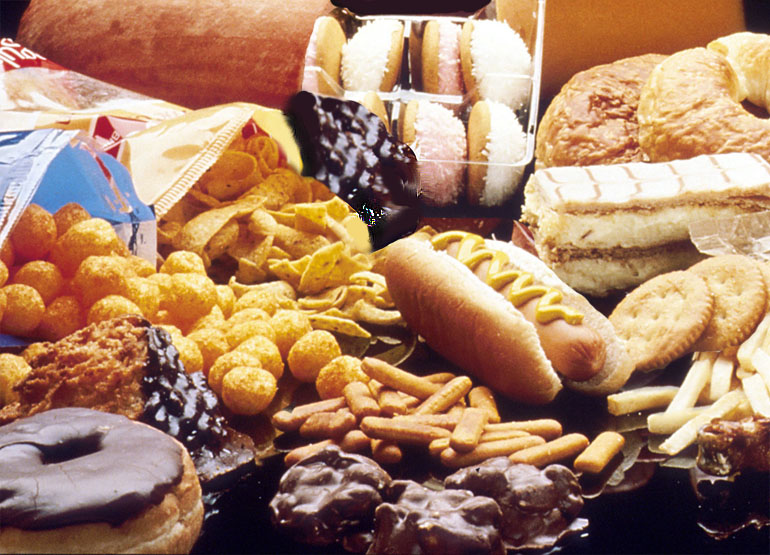Health Pages
Trans Fats
Trans Fats: "AVOID"
Trans fatty acids are fats formed when vegetable oils are hydrogenated (oils start out liquid but are turned into solids through the manufacturing process). So, hydrogenation is the process that keeps liquid oil solid at room temperature and prevent them from becoming rancid. It also makes healthy vegetable oils more like not-so-healthy saturated fats. You do not always know when you are eating hydrogenated fats because they are hidden in the products and not always listed on labels. Here's a tip: If a food can last in your pantry for weeks without going stale, trans fat might be keeping it fresh.
Trans fatty acids come from partially hydrogenated vegetable oils which are found in margarine's, shortenings, cakes, pies and cookies (especially with frosting), candies (especially with creamy fillings), crackers, snack foods, microwave popcorn (buttered and flavored varieties), frozen pizzas, frozen biscuits, pastries, muffins, doughnuts (especially frosted or cream-filled), breaded and fried chicken and fish, fried fast foods.
Food makers use trans fats to enhance taste and texture and make foods last longer. On food label ingredient lists, this manufactured substance is typically listed as "partially or fully hydrogenated oil". Also avoid products with emulsifiers like mono- and diglycerides (they are made by partially hydrolyzing vegetable fats, such as soybean oil, and palm oil). Trans fats can be also hidding in some artificial colors and flavors and in some other products with refined oils (like soybean, cottonseed, canola, and corn oil).
Trans fats also occur naturally in smaller quantities in beef and milk products (bacteria in cattle produce trans fat that gets into meat and milk).Trans fat also occurs naturally in vegetable oils and forms when vegetable oils are purified.
Trans fatty acids, also known as trans fats are the worst type of dietary fats. They raise the total cholesterol and LDL "bad" cholesterol level of the blood more than any other food in the diet. Some researches show that trans fatty acids also lower the level of beneficial HDL or "good" cholesterol which in turn increases the risk for heart disease and other diseases.
Trans fats have a negative impact on the body and are widely considered to be unhealthy because they are associated (in an intake-dependent way) with increased risk of such as coronary artery disease, a leading cause of death in Western nations, and other diseases such as stroke, heart disease, type 2 diabetes and many other diseases.
The amount of trans-fatty acids in the diet can be reduced by avoiding and limit foods that contain hydrogenated plant oils. Your recommended daily intake: 0 grams.
Related links and recommended readings:
- About Fats
- Fats and Oils
- Low Fat Diet
- Learn More About Cholesterol & Fats
- Fat Facts
- Fat Scoreboard
- Test Your Fat I.Q.
- Cholesterol and You
- Cholesterol Content of Commonly Used Food
- Diet and Eating Out
- Hydrogenated Fat Dangers
- About Trans Fat and Partially Hydrogenated Oils
- Why You're Still Probably Eating Trans Fat
- Hidden In Plain Sight: Trans Fats Hidden in Many Foods
- Foods to Avoid: Trans Fat
- Trans Fats
- Artificial Trans Fat: A Timeline
- Transfatty acid-forming processes in foods: a review



